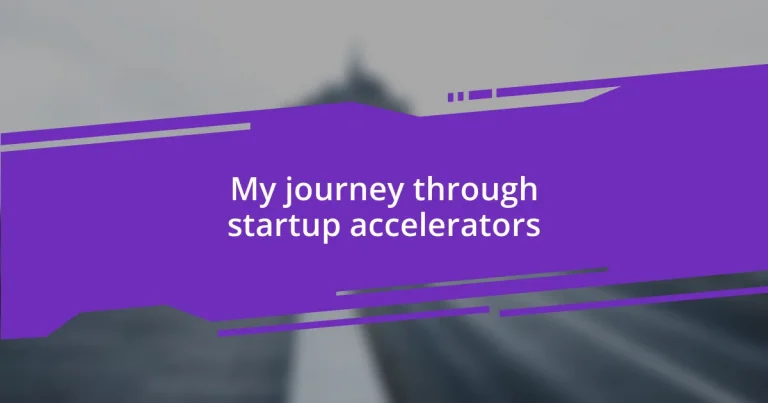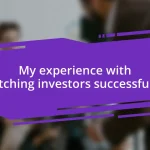Key takeaways:
- Startup accelerators provide mentorship, funding, and a supportive community, facilitating rapid growth and accountability for early-stage startups.
- Choosing the right accelerator involves evaluating factors like mentorship quality, network strength, and cultural fit, emphasizing quality relationships over sheer numbers.
- Success post-accelerator is measured not only by financial metrics but also by the ability to pivot based on feedback and the quality of community connections formed during the program.
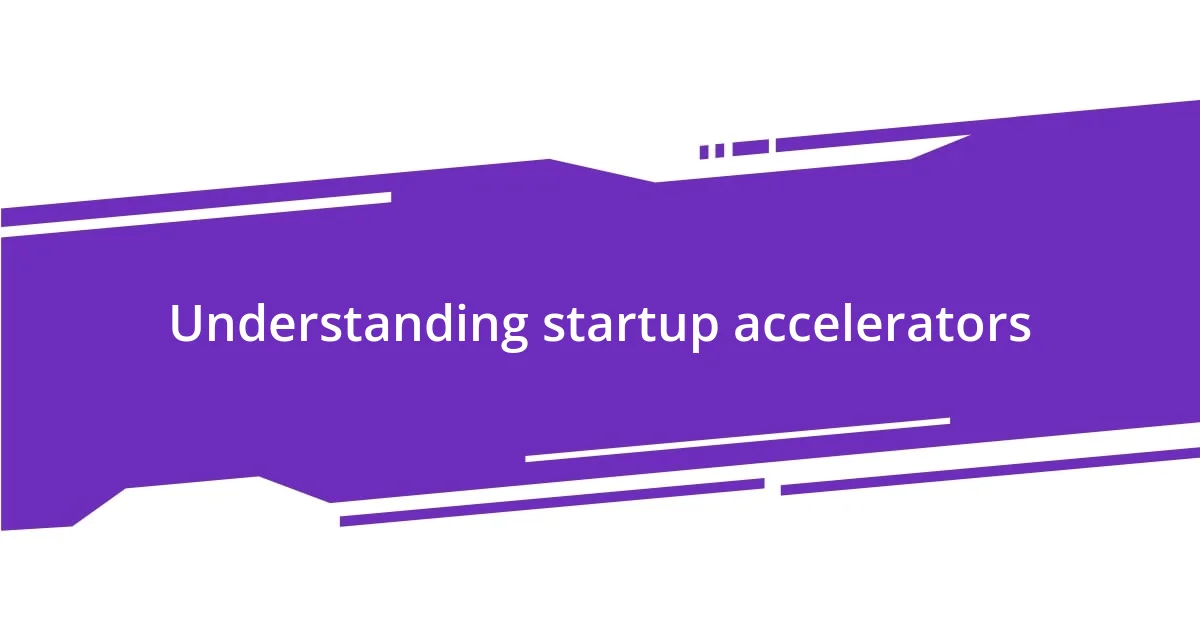
Understanding startup accelerators
Startup accelerators play a pivotal role in the entrepreneurial ecosystem. I still remember my first encounter with an accelerator, where I felt a mix of anxiety and excitement. It was like stepping into a whirlwind of ideas and possibilities, surrounded by fellow entrepreneurs who shared the same dream. Have you ever felt that rush of potential in a room full of like-minded people?
These programs typically offer mentorship, funding, and resources to early-stage startups, helping them refine their business models faster than they might on their own. I vividly recall late nights working alongside mentors who challenged my ideas and pushed me outside my comfort zone. The feedback was sometimes tough to swallow, but that’s exactly what helped me grow. How often do we hold back from seeking constructive criticism, especially when it could lead to our success?
Additionally, the structured environment of an accelerator fosters accountability and drives progress. I’ll never forget the camaraderie formed during those intensive weeks, where we celebrated small victories and faced challenges together. If you’re considering an accelerator, think about what you might gain from that support system. Isn’t it amazing to imagine how collective journeys can lead to individual breakthroughs?
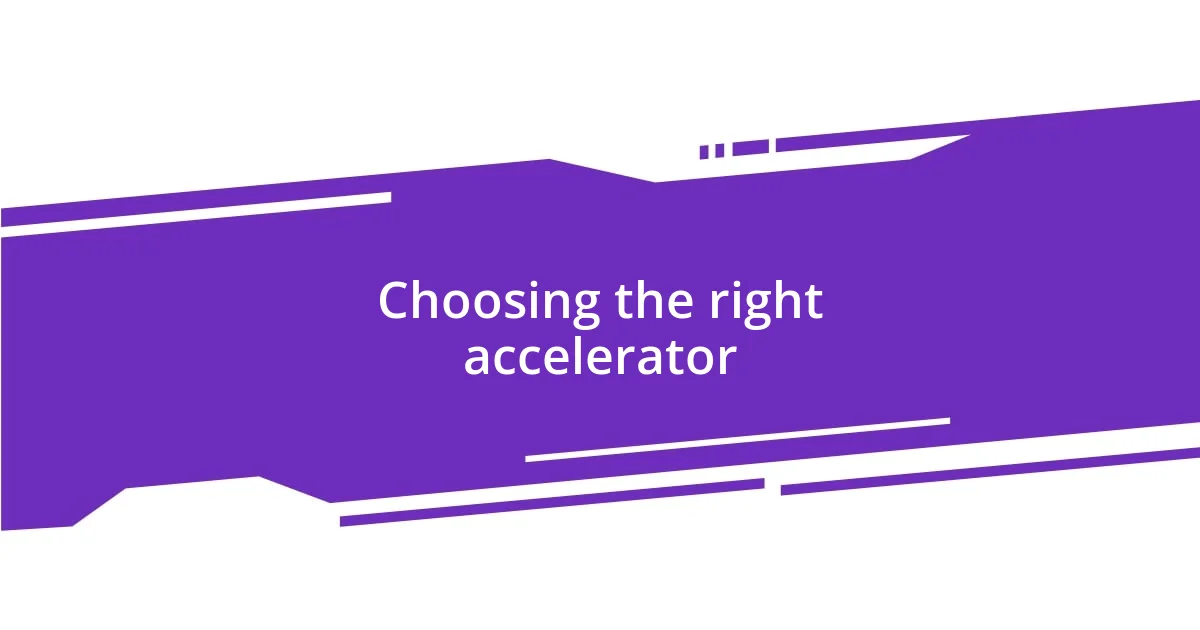
Choosing the right accelerator
Choosing the right accelerator can feel like a daunting task. I remember pouring over countless options, trying to find the one that aligned with my startup’s vision and values. It’s essential to consider factors like the program’s focus, mentorship quality, and previous successes. Are you curious about what made me settle on one particular accelerator? For me, it boiled down to finding mentors who understood my industry deeply and were genuinely invested in my growth.
When comparing accelerators, I found it helpful to create a simple table to visualize their different offerings. I looked at each program’s funding amount, duration, and network strength. Those elements heavily influenced my decision. Ultimately, I realized that it’s not just about funding, but also about the ecosystem you’re joining. How do the connections you make align with your goals? It’s something I wish I had focused on more in my early days.
Your choice of accelerator can shape your startup’s journey, sometimes beyond what you initially expect. I’ve come to appreciate that while a large network can be enticing, the right fit is more about meaningful connections. In my experience, I thrived when I felt truly supported, not overwhelmed by sheer numbers. This experience taught me an invaluable lesson: it’s about quality over quantity when it comes to the mentoring and support I sought.
| Factor | Considerations |
|---|---|
| Funding Amount | How much financial support does the accelerator offer? |
| Program Duration | What’s the timeline for the accelerator? Is it long enough to achieve your goals? |
| Mentorship Quality | Who are the mentors and what’s their experience in your industry? |
| Network Strength | Is there a strong network of alumni and industry connections to tap into? |
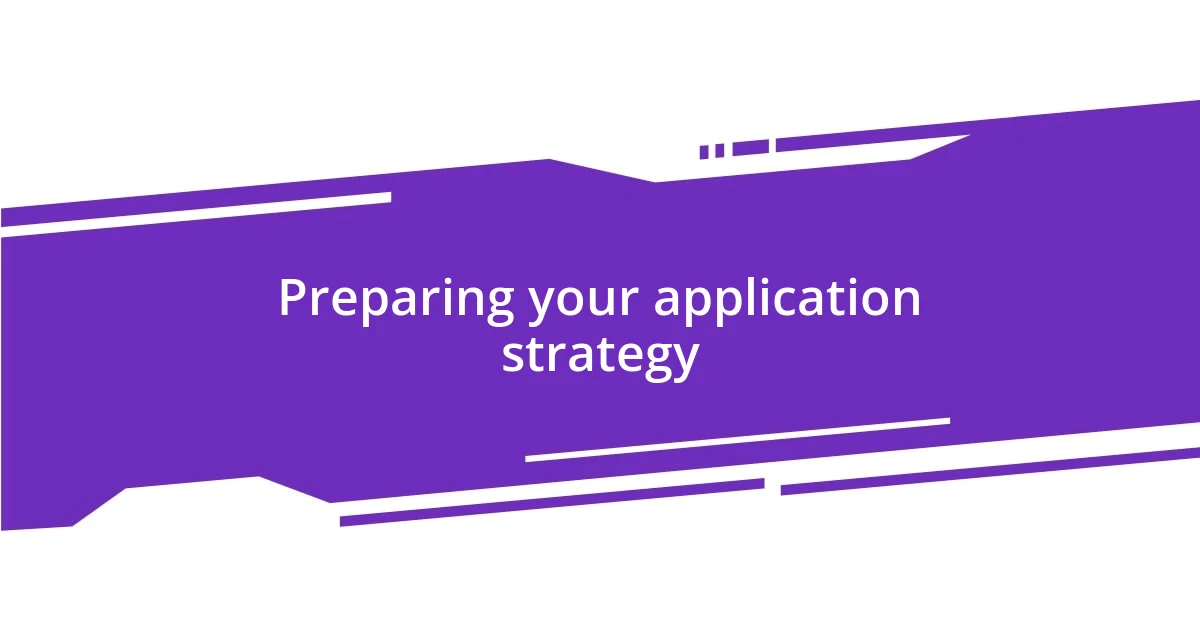
Preparing your application strategy
Preparing your application strategy for an accelerator requires careful thought and a tailored approach. I recall spending hours brainstorming and refining my narrative to ensure it clearly articulated my startup’s mission and vision. It wasn’t just about listing my achievements; it was about conveying my passion and the problem I aimed to solve. Crafting a compelling story can genuinely resonate with application reviewers—how does your journey align with the accelerator’s purpose?
Here are some key components to consider as you develop your application strategy:
- Clear Value Proposition: What makes your solution unique and beneficial?
- Team Strength: Highlight the skills and experiences of your team that complement your startup’s goals.
- Market Understanding: Show that you thoroughly know your target audience and market dynamics.
- Goals and KPIs: Include specific, measurable objectives you wish to achieve during the accelerator.
- Cultural Fit: Research the accelerator’s values and mission to reflect how your startup aligns with them.
As I navigated my application process, it became evident that authenticity was crucial. I recall sharing a personal experience that inspired my startup, which not only differentiated my application but also made it more relatable. In the end, a genuine narrative can create a connection that stands out among many well-crafted resumes.
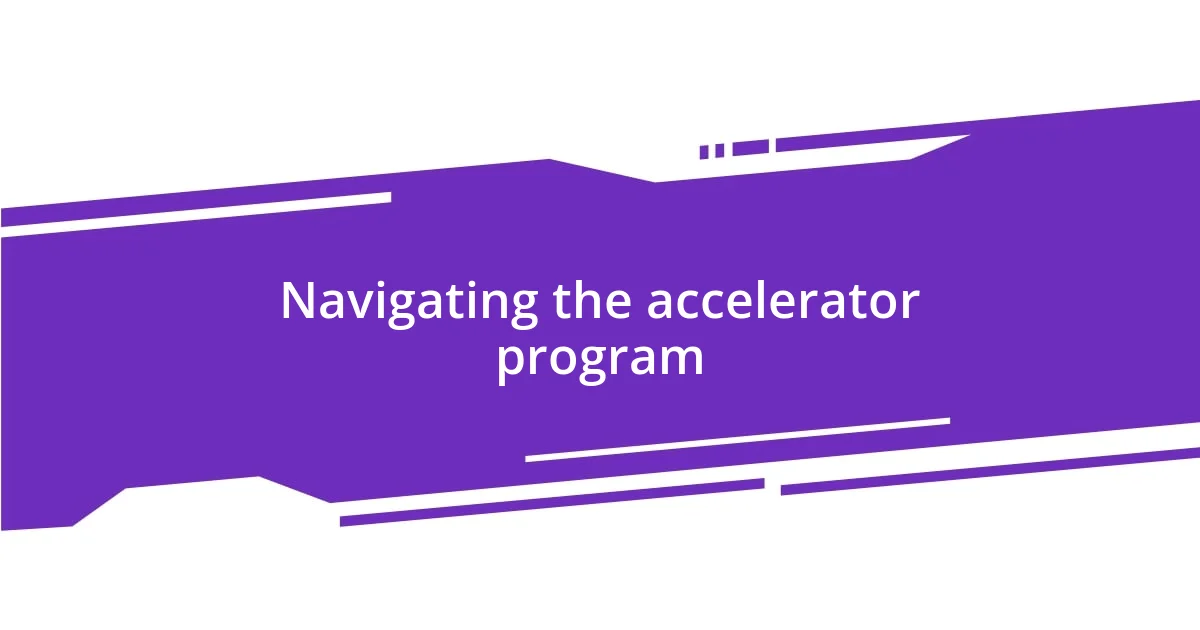
Navigating the accelerator program
Navigating the accelerator program can be a whirlwind experience filled with opportunities and challenges. I remember stepping into that first meeting, feeling both excitement and intimidation. The fast-paced environment forced me to adapt quickly, build relationships, and soak up invaluable insights. Have you ever felt overwhelmed in a new situation, only to discover it was exactly what you needed for growth? That’s how I felt every day.
One of the most rewarding aspects of my journey was immersing myself in the program’s community. I made it a point to seek out fellow entrepreneurs, not just for networking but for genuine support and collaboration. The late-night brainstorming sessions over coffee often sparked innovative ideas and solutions we might not have considered alone. Isn’t it fascinating how the magic of shared experiences can drive both personal and professional growth?
As I progressed through the program, I learned the importance of being open to feedback. I distinctly remember a mentor’s advice that resonated deeply: “Critique is a gift.” It revolutionized my approach, helping me see challenges as opportunities for improvement rather than setbacks. This mindset shift not only helped refine my startup’s model but also built my resilience. Aren’t those moments of realization what make this journey so worthwhile? Each piece of feedback carved out a clearer path to success, ultimately guiding me to the next stage of my entrepreneurial adventure.
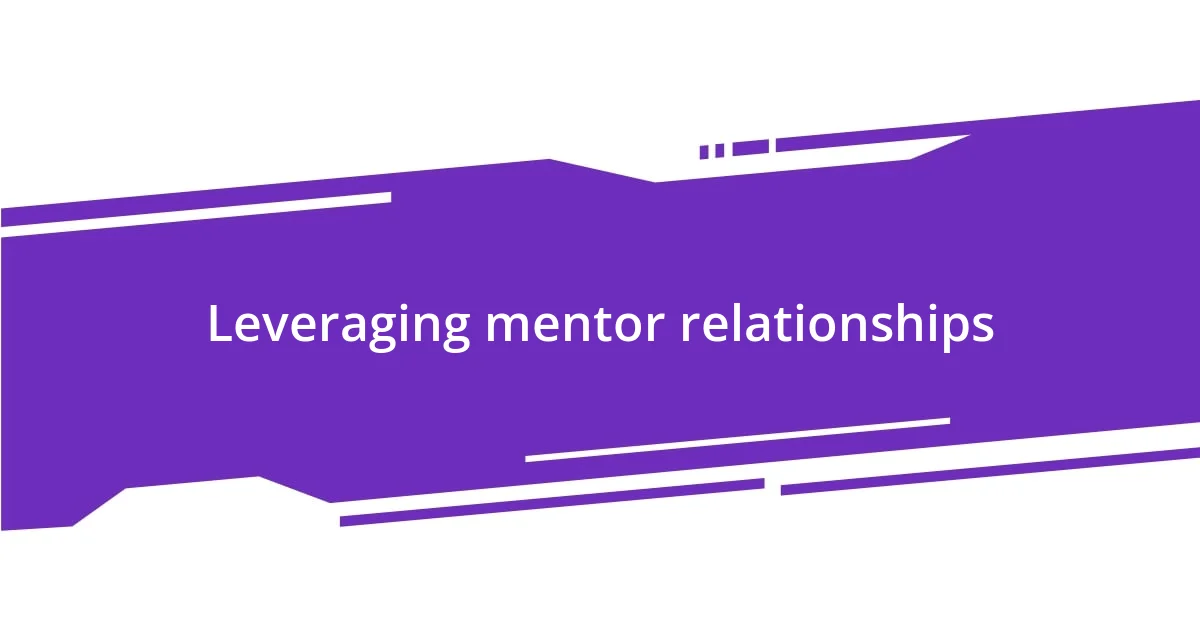
Leveraging mentor relationships
One of the most significant elements of my accelerator experience was the mentor relationships I cultivated. I vividly remember my first mentoring session; I walked in with a business plan, yet what I walked away with was an entirely new perspective. The mentor didn’t just focus on what was written on paper—he probed deeper, asking me questions that made me rethink my approach. Have you ever had someone challenge your thinking so profoundly that it felt like a light bulb switched on? That’s exactly what happened for me.
Mentors provide not just guidance but a sense of accountability. I recall sharing my weekly goals with my mentor, who would often follow up with me to check on my progress. It created a sense of urgency; knowing someone genuinely cared about my success pushed me to work harder. It’s a powerful dynamic—how can we support each other in our entrepreneurial journeys? I think that’s precisely what makes these relationships invaluable; they encourage us to reach our full potential.
Over time, I learned how to leverage these mentor relationships strategically. I became proactive, seeking specific advice on areas where I felt uncertain, like scaling my marketing efforts. One day, I sheepishly asked for feedback on a pitch I felt unsure about. The mentor’s constructive criticism was eye-opening, and applying those insights drastically improved my delivery. What I’ve realized is that mentorship isn’t just about advice—it’s a two-way street where vulnerability can lead to immense growth. Are you ready to embrace that level of honesty in your own journey?
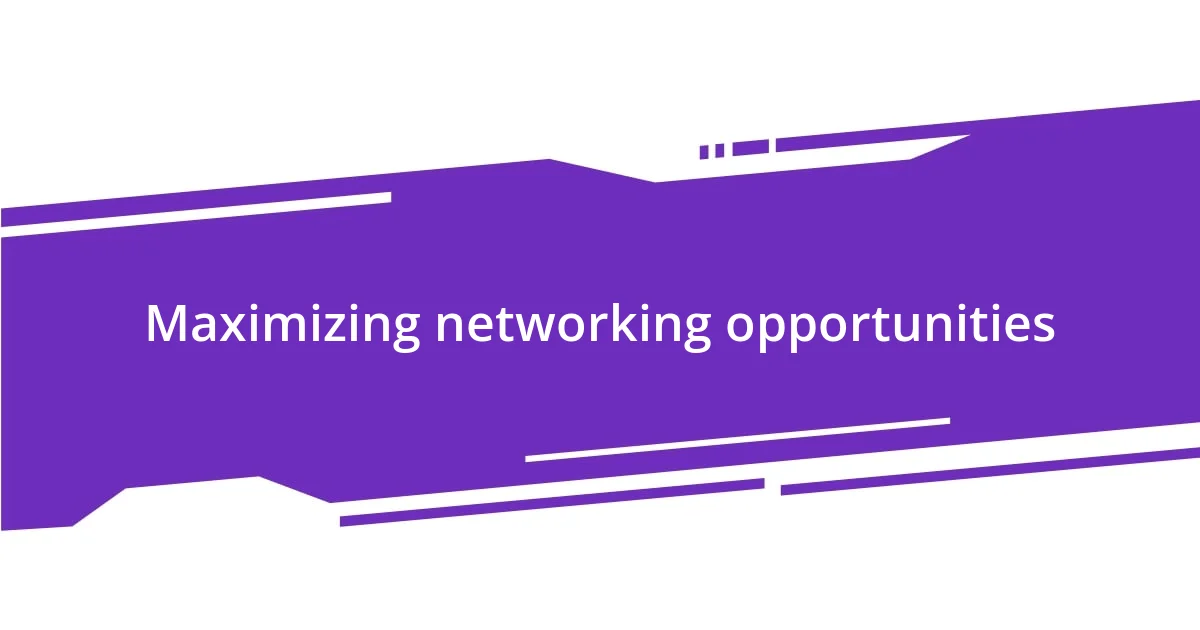
Maximizing networking opportunities
Maximizing networking opportunities in an accelerator is all about intentionality. I made it a habit to attend every event I could fit into my schedule, from pitch nights to casual meetups. It’s amazing how one chance conversation can lead to a valuable partnership or even a mentor. Have you ever had a seemingly random encounter that turned into something significant? For me, it was a chance discussion with a fellow participant that led to a collaboration on a project we never would have brainstormed alone.
I also learned to approach networking with a mindset of giving rather than just taking. At one event, instead of just promoting my own work, I asked others about their projects and struggles. What I found was that genuine interest often opened doors I hadn’t anticipated. This shift in perspective made every interaction more meaningful and memorable. It reminded me that building relationships is as much about what you can offer as it is about what you hope to gain.
Moreover, following up with people after meeting them was crucial. I started sending quick messages on LinkedIn, mentioning something specific from our conversation. It kept the connection alive and often sparked further dialogue. Isn’t it incredible how a simple “Great talking with you!” can lead to deeper discussions later? Each follow-up felt like laying another brick in a network that supported my growth, reinforcing the idea that networking is an ongoing journey.
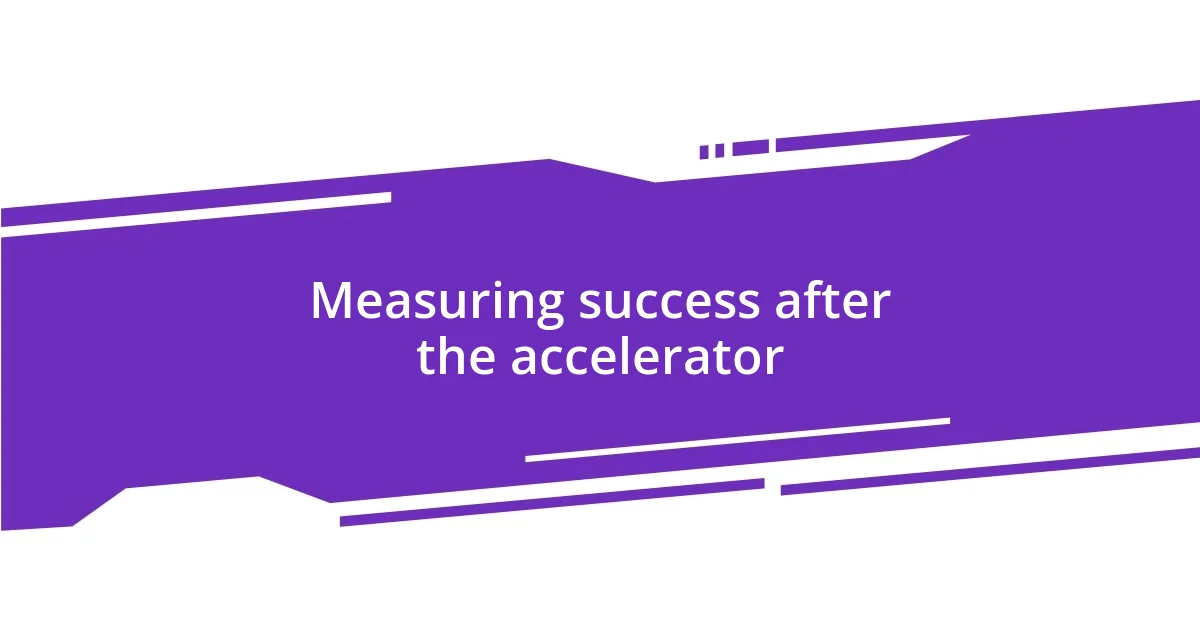
Measuring success after the accelerator
Measuring success after the accelerator is multifaceted and deeply personal. For me, it wasn’t just about hitting revenue targets or growing my customer base, but also about the learning milestones I achieved. I remember reflecting on the first few months post-accelerator, and it struck me how much my mindset had shifted. Are you measuring success by tangible metrics, or by the internal growth that often goes unnoticed? It turns out, both are essential.
One of the most telling indicators of success for me was the ability to pivot based on feedback. I recall a moment after launching my minimal viable product when customer responses were less than stellar. Instead of feeling defeated, I viewed it as an opportunity for growth. Those early critiques led to significant improvements, and within a few weeks, I noticed an uptick in user engagement. How do you respond to challenges? For me, it became a marker of resilience—an important aspect of success.
Finally, the depth of my community connections stood out as another benchmark for success. I still remember the day I received a message from a local entrepreneur I had met during the accelerator. They reached out to collaborate on a community-driven project, reminding me of the lasting relationships forged during that intense period. Success, it seems, transcends financial gains; it breeds a connectedness that enhances our entrepreneurial journeys. Have you ever felt that sense of belonging that really fuels your passion? That’s the kind of success I cherish most.












